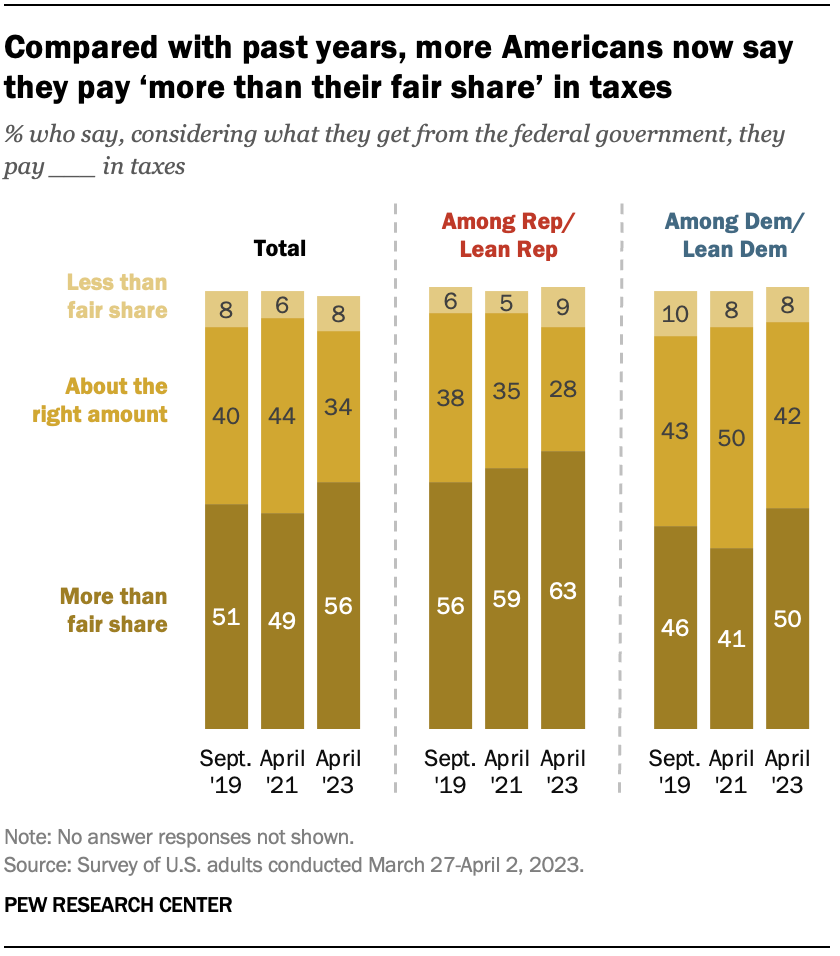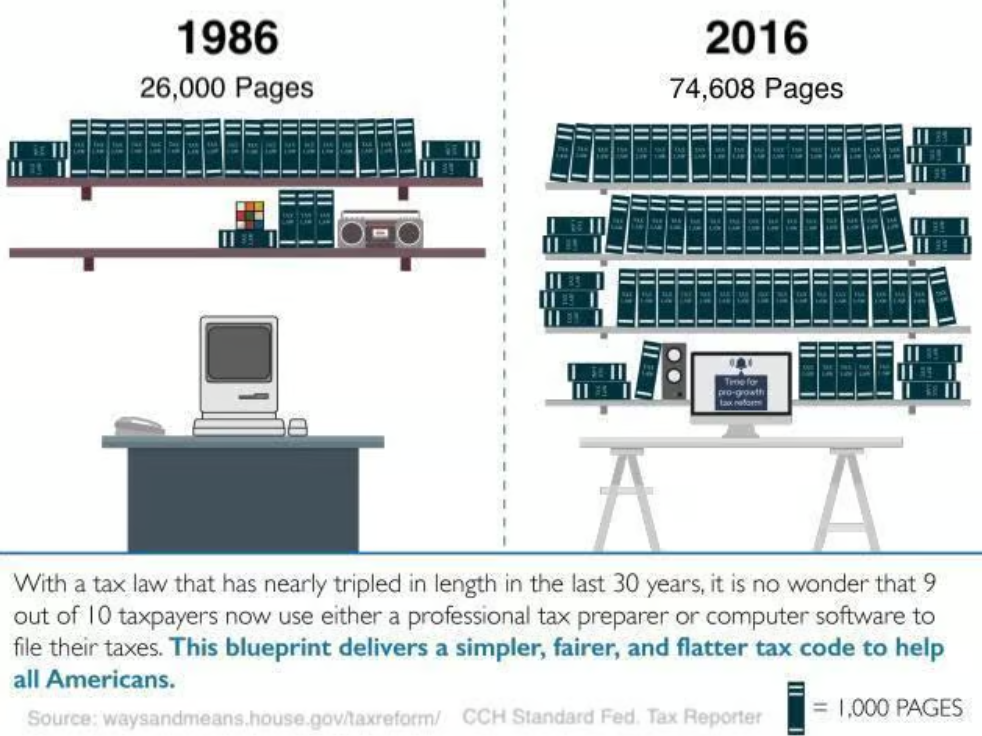In life, only two things are guaranteed: death and paying taxes.
According to a Pew Center Research study, the majority of Americans think they pay more than their fair share of taxes.

Percentage of Americans who believe they pay more than their fair share of taxes.
The key to reducing your yearly tax liability as a small business owner? Understanding which tax deductions your business can legitimately claim.
It might come as a surprise that even ordinary business expenses such as your AC bill or the cost of a new office chair mey be deducted from your taxable income. In this guide, we’ll show you 22 small business tax deductions you can take advantage of for the 2024 tax season.
Key Takeaways:
Maximize Deductions: Understanding tax deductions may reduce your yearly tax obligations. Even ordinary business expenses may be deducted from your taxable income.
Home Office Deductions: Small business owners may deduct expenses relating to their use of a part or all of their house for business purposes.
Professional Services Deductions: Legal and professional fees charged by attorneys or accountants for business operations are eligible to be deducted from taxes.
Leverage Tax Credits: Tax credits can reduce tax liability and motivate investing in certain areas, aiding business growth.
Plan for Retirement: Contributing to retirement plans such as SEP-IRAs, SIMPLE IRAs and solo 401(k)s can reduce taxable income and save for the future.
Maximizing Tax Efficiency for Small Businesses
Small businesses — be it sole proprietorships, partnerships, corporations or LLCs — have the opportunity to decrease their taxable income by claiming various expenses as tax deductions.
As such, it’s important that you understand how taxes work – and how to leverage the tax code the way Insiders and Elites do to build wealth.
But good luck navigating the sprawling and complex tax code; according to Public Law 117-154, dated June 23, 2022, the U.S. Tax Code stood at 6,871 pages. When you include the federal tax regulations and official tax guidance, that number jumps to ~75,000 pages.

Tax law tripled in length between 1986 and 2016.
This is one reason why you should consult a CPA to stay informed about the latest deductions to take advantage of these incentives and ensure you’re prepared for any changes that might affect your tax liabilities.
That being said, here are some of the top small business tax deductions:
1. Home Office Deductions

Small business owners may be able to take advantage of the home office deduction, which allows them to deduct expenses relating to their use of a part or all of their house for business purposes. This includes mortgage interest, depreciation, utilities and your renter’s insurance costs.
Home-based small businesses are also eligible to deduct $5 per square foot of your home that’s designated for business use, up to a limit of 300 square feet.
2. Business Supplies and Equipment Write Offs
Tax deductions are available for business expenditures such as office furniture, writing utensils, computers and work software, as long as you use them for business purposes within the year in which they were purchased.o ffice furniture and electronics. It should also be noted that items like computers need to have their value spread out over several years with depreciation being taken into consideration when claiming these deductions.
3. Professional Services Deductions
Business expenses like legal and professional fees charged by attorneys or accountants for business operations are eligible to be deducted from taxes.
4. Vehicle Expenses and Mileage Deductions
If you’re using your vehiclefor business activities, all costs related to its operation and maintenance may be deducted. These include costs such as car depreciation, fuel usage, oil changes registration fees repairs and insurance payments. You may also deduct the distance you drive for business purposes, either by subtracting the actual miles driven for business, or by applying the standard mileage deduction of $0.56 for each mile driven.
5. Business Meal Deductions
As a small enterprise, you are eligible to deduct 50% of the costs incurred on qualifying food and drink purchases. Full deductions may be claimed on throwing a party for employees and their spouses, as long as it is primarily beneficial to non-highly compensated employees.
A non-highly compensated employee is anyone who does not meet the following criteria:
Highly compensated: They earn $130,000 or more per year.
10% owner: This is someone who owns 10% or more of your company.
Relative: They are a family member or direct descendant of a 10% owner.
The following employee appreciation events are 100% tax-deductible according to the IRS:
Holiday parties
Annual picnics
Summer outings

6. Insurance Premiums and Coverage Deductions
Businesses are allowed to deduct certain insurance premiums from their taxable income. Examples include liability, health, fire and flood protection coverage, theft insurance and business interruption policies, all of which must be reasonable in cost for the deduction to apply. It is important that these necessary premium payments align with your company’s requirements so you may benefit from this tax break advantageously.
7. Startup Costs and Capital Expenses Write Offs
Starting a business may involve hefty startup expenses and capital outlays, but the good news is that these costs may be subtracted as tax deductions to kick off your venture on firm footing.
Advertising fees for staff training, procuring inventory or leasing office space are some of the associated initial expenditures which count towards deductible start up costs. Meanwhile, long-term assets like machinery and buildings must either be written off over time via amortization or claimed in total under Section 179 within their first year of operation as a qualifying expenditure.
8. Employee Salaries, Benefits, and Contract Labor Deductions
As a small business owner, you may deduct several expenses that come with running the company such as employee salaries and benefits along with any contracted labor costs. This includes wages, benefits, vacation pay, paid time off bonuses or commissions, plus all employment taxes related to payrolls.
Here are some conditions to be met when deducting salary and benefit expenses:
The employee should not be a sole proprietor, a partner, or a member of the LLC in the business
The salary must be reasonable and necessary
The services assigned to the employee must have been provided
9. Utilizing Tax Credits for Business Growth
Tax credits are a great way for businesses to reduce their tax liability and motivate investing in certain areas. These enable companies to save on funds which they may then reinvest into furthering the growth of their business.
There exist numerous types of available tax credits such as those that support research, energy efficiency or employment. To take full advantage of these incentives firms must submit particular forms with all necessary data like: type, total amount and any costs associated with it towards IRS (Internal Revenue Service).
10. Retirement Plan Contributions and Deductions
For small business owners, contributing to retirement plans such as SEP-IRAs, SIMPLE IRAs and solo 401(k)s may be a great way of taking advantage of the Retirement Plan Contributions Deduction. By reducing their taxable income in this manner they may save for the future while simultaneously minimizing tax liabilities during tax season.
11. Internet and Phone Bill Deductions
If you use phone and internet services for your business, these expenses may be tax deductible. For this to apply though, the usage must be essential to carrying out daily operations within the company. If, however, your phone and internet usage is used for both personal and business purposes, you’re only permitted to deduct the portion of the cost that is directed towards your business activities.
12. Education and Training Expense Deductions
Expenses devoted to educating and training oneself in order to develop necessary business skills may be deducted from taxes. Appropriate costs that meet this criteria include seminars, books, classes, subscriptions associated with one’s professional activities or industry as well as workshops.

13. Advertising and Marketing Expenses Write Offs
Investing in advertising and marketing is critical to increasing awareness of your business and drawing new customers. Fortunately, these expenses may also be deducted from your taxes. It’s essential that all documentation regarding any ad or promotional spending is kept accurately for proof when it comes time to file deductions.
14. Bad Debt Write Offs
When a business loan isn’t repaid, businesses may claim debt write-offs for the bad debts they incur (e.g. credit card debt). These deductible costs allow companies to make headway financially despite experiencing cash flow issues.
15. Bank Fees and Charges
You are allowed to deduct any fees or extra charges that you incur on your business bank account and credit card. This includes charges like monthly service fees and yearly credit card fees.
16. Health Insurance Premium Deductions
For self-employed individuals and owners of small businesses, there are deductions available on health insurance premiums. This includes coverage for the policy holder, their spouse as well as any dependents they have.
Claiming these deductions helps to reduce a business owner’s taxable income while still getting necessary healthcare protection.
17. Cost of Goods Sold Deductions
Claiming the deduction for Cost of Goods Sold (COGS) allows you to save on expenses incurred in producing, selling or buying items used by your business such as labor charges, raw materials and warehousing fees connected with holding inventories.

18. Charitable Contributions and Deductions
Charitable donations provide an opportunity for a business to show their support and give back while still saving on their tax bill. For businesses structured as a sole proprietorship, LLC or partnership, these expenditures may be reported on your personal tax filings. However, if your business is a corporation, you could report charitable contributions on your corporate tax return.
19. Medical Expenses
If you itemize your deductions for a taxable year on Schedule A (Form 1040), Itemized Deductions, you may be able to deduct expenses you paid that year for medical and dental care for yourself, your spouse, and your dependents. You may deduct only the amount of your total medical expenses that exceed 7.5% of your adjusted gross income.
If you are self-employed and bear the cost of your own health insurance – as long as you report a net profit on your Schedule C – you might be able to deduct 100% of your health, dental, and long term health care insurance premiums.
You might be able to claim the self-employed health insurance deduction as an adjustment to your gross income on Schedule 1 of Form 1040. You might claim this deduction regardless if you choose to claim the standard deduction or itemize your deductions.
However, if either you or your spouse have access to an employer-sponsored subsided health plan – which is a plan where the employer pays a portion of the premium – you cannot take the self-employed insurance deduction.
In addition, you may not deduct funeral or burial expenses, nonprescription medicines, toothpaste, toiletries, cosmetics, a trip or program for the general improvement of your health, or most cosmetic surgery.
You also may not deduct amounts paid for nicotine gum and nicotine patches that don’t require a prescription.
20. Energy Efficiency Upgrades and Deductions
Business owners who invest in eco-friendly improvements to their businesses are able to take advantage of deductions for energy efficiency upgrades, thus helping them save money on energy bills and benefit the environment. Come 2023 they could be eligible for a credit up to $3200 when it comes improving the home with green initiatives.
21. Qualified Business Income Deduction
Small business owners might benefit from a small business tax deduction, also known as the qualified business income (QBI) deduction. This enables them to decrease the taxable income of their independent contractor or pass-through businesses by up to 20%.
22. Business Travel Expenses
Costs incurred during business trips, including flights, hotel stays, car rentals, taxi fares, shipping of baggage, dry cleaning and laundry, business calls, tips, and more may also be deducted from your taxes. However, to classify your journey as business-related travel, it must:
Be crucial for your business operations.
Require you to travel away from your “Tax Home” – which is the entire city or general area where your main place of business or work is located, regardless of where you maintain your family home.
Extend beyond a regular workday, and you need to get sleep or rest to meet the demands of your work while away.
If you’re self-employed, you can deduct travel expenses on Schedule C (Form 1040), Profit or Loss From Business (Sole Proprietorship), or if you’re a farmer, on Schedule F (Form 1040), Profit or Loss From Farming.
Summary
Overall, small business owners must take advantage of the tax deductions available to them in order to accelerate their wealth building journey and reinvest more capital into their company. Two of the most important steps in this regard are:
Taking the time to understand what small business tax deductions are available to you.
Making sure the correct receipts & documents are maintained showing all business expenditures.
Consulting and a qualified tax adviser so that no opportunities for reduced liability get overlooked.
Frequently Asked Questions?
What can be tax write-offs for small business?
Small businesses may reap the benefits of various tax write offs, including those for startup expenses, home office deduction and business supplies. Home insurance premiums, health insurance costs as well as bank fees are also items eligible to be deducted come tax season. Businesses may enjoy other deductions such as phone bills, internet charges cleaning services/supplies repairs & maintenance car expenses mileage etc. It is strongly suggested that one talk to a professional in order to make informed decisions when it comes to taking advantage of all possible tax deductions.
Do LLCs get tax write-offs?
LLCs may be able to get tax write-offs, with the Qualified Business Income Deduction (QBI) and Tax Cuts and Jobs Act (TCJA) allowing them up to 20% deductions from their business income. Other company costs may also be written off.
How much can you write-off when you own a business?
Small business owners may benefit from several tax deductions, including 100% of travel and other business-related expenses. They may also be eligible for the Section 179 deduction up to a maximum amount of $1,080,000 as well as a write-off on gifts per person worth not more than $25. Self employed individuals may deduct their health premiums too.
What is a tax write-off for starting a business?
For business start-ups, certain expenses such as equipment, employee training, market research and analysis, promotion costs like advertising and marketing fees may be eligible for a full tax write-off up to an amount of $5,000. All these activities, however need to be considered essential expenditures by law before they can benefit from this allowance.
Want to learn more about investing in private market deals?
Here at Equifund, we help investors access early-stage opportunities not found anywhere else.





